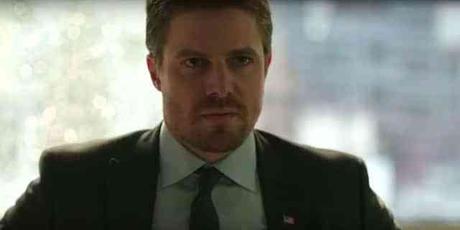
Arrow exists in a universe in which people can be brought back to life thanks to a magic hot tub, nuclear bombs can destroy small U.S. towns without altering the world order in any meaningful way, mystical totems can grant people immortality and super strength and an entire town can somehow still be completely oblivious to the fact that its mayor is a notorious vigilante despite mountains of evidence. And that's just the stuff which has happened on Arrow, completely ignoring the time traveling knuckleheads on Legends of Tomorrow, super powered speedsters on The Flash and malicious and malevolent aliens on Supergirl. Heightened reality, thy name be Arrowverse (or Flarrowverse, if you prefer).
So, naturally, Arrow did a gun control episode last night.
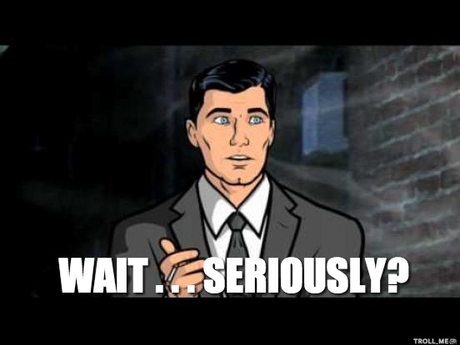
Yep. Arrow got super serious about gun control for 40 minutes since this is obviously the universe you go to for timely social commentary, I say sarcastically before remembering all of the feminist and LGBTQ commentary weaved throughout Supergirl and discussions of racism on Legends. However, Arrow 's "Spectre of the Gun" - depicting a mass shooting in the mayor's office which Oliver is forced to contend with not as Green Arrow but instead as Mayor Queen - is the first blatant "very special episode" in both show and Arrowverse history.
Marc Guggenheim, who wrote the episode, told reporters and fans to forgive him this one episode indulgence (via ComicBook.com):
I grew up in a time where it was commonplace, like literally every week, for a one-hour drama to tackle the issues of the day. Somewhere along the line we got away from that - like, the whole industry got away from that. And now you've got like Blackish and Carmichael Show, but as far as network dramas are concerned? Really not tackling current events, current issues. So we went into season 5 with the desire to. It's the fifth season; we've hopefully earned the freedom to, in 23 episodes of television, you can have 22 episodes of candy and one episode of vegetables. We sort of felt that gun violence felt like the right topic, because of its topicality but also because of the level of gun violence that's on Arrow. We could have done an episode on abortion, but that's not really where the show lives, so gun violence sort of felt like the right thing to tackle.
Beyond satisfying the social responsibility Guggenheim might feel as a storyteller who grew up on the "very special episodes" of St. Elsewhere, Picket Fences and LA Law, "Spectre of the Gun"also functions to placate any fans who've been wondering where the heck the activist, lefty version of Green Arrow from the comics has been all this time. He's been replaced on the show by Stephen Amell's decidedly apolitical version of the character, but, hey, at least Amell's version also had to deal with drug-addicted sidekicks/family members:
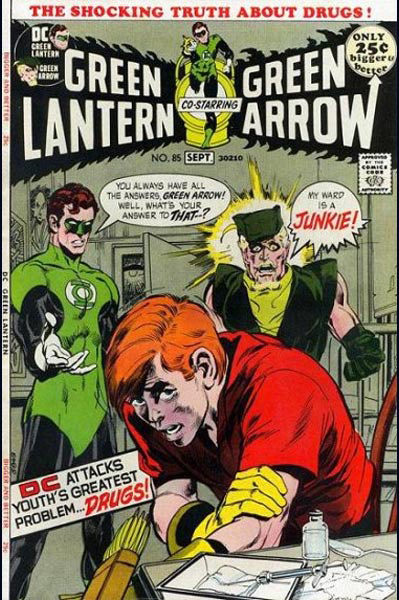
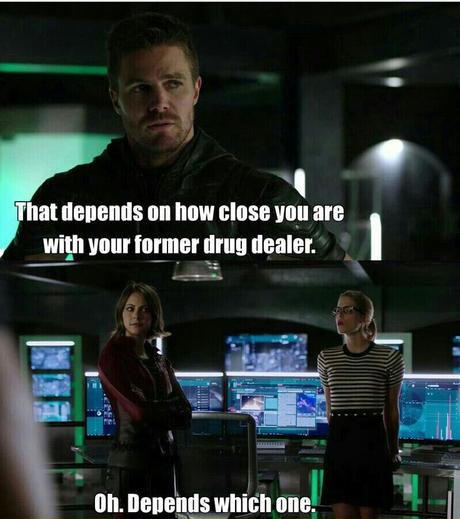
Gun control is a worthwhile topic to address. In the time since Guggenheim and crew (including director Kristin Windell) finished filming this episode on the Arrowverse backlot in Vancouver there's been a mass shooting conducted by a white nationalist against a mosque in Quebec and the U.S. House of Represenatives voted to repeal an Obama-era regulation which sought to " limit the ability of those with mental illness to purchase guns." Plus, stories like this one about a 2-year-old girl dying after being shot by a gang member who was firing at her aunt's boyfriend continue to come out of Chicago at an alarming rate.
However, even with its preponderance of gun-toting characters is Arrow truly the right messenger to wade into this debate? Nuance is not exactly this show's strong suit, and as much as it claims to be the gritty, realistic center of the Arrowverse it's still semi-shocking to have a character like Dina Drake discuss the vagaries of job and apartment application in "Spectre of the Gun." She expresses her uncertainty with how to go about the explaining the three-year hole on her resume where she was hunting down her boyfriend's killer, but Diggle encourages her at to least try, which she does successfully (now she's a cop again; good for her).
Jobs? Apartments? Resumes? That's not what we're used to hearing about on Arrow. Heck, last week a man with magical rags absorbed a nuclear blast and didn't die, and Russian mobsters talked endlessly about brotherhood. That more in Arrow 's sweet spot. So, to have Team Arrow debate gun control is just awkward, regardless of whether or not it ostensibly makes sense since the majority of the vigilantes on this show now carry a gun. There's just no getting around how jarring it is to suddenly have Curtis and Lance arguing for fewer guns while Rene and Dinah disagree, Felicity sues for peace and Oliver shrugs and tries to figure out exactly where he stands on the issue.
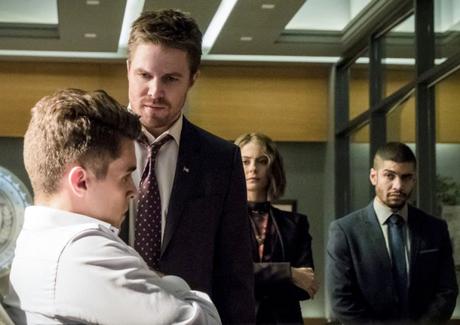
Gun control, like so many other parts of our society these days, is often treated like a binary issue. Either you're for it or you're against it, and your mind will not be changed by some Hollywood movie (sorry Miss Sloane ), magazine article (nice try, ) or TV episode, especially considering the way other's opinions are often rejected outright ("The no-good liberal media" vs. "Gun-loving conservative nutjobs") if they're not already filtered out by our social media bubbles.
This is partially why Joss Whedon knew the best method for addressing social issues in genre television is to use metaphor, which he used so ingeniously and often hilariously on Buffy the Vampire Slayer and Angel and less successfully on Dollhouse. Through metaphor, you can speak to complicated issues without automatically alienating half of your audience. Whedon didn't invent that, of course. That goes all the way back to Rod Serling and The Twilight Zone.
However, there may have been no way to speak to this issue on Arrow without tackling it full-on. As such, a relative nobody angry at Capital Hill for killing a gun registry bill (and thus leading, he wrongly concludes, to the death of his family) opens fire on Oliver's staff, killing at least 7, to force him to take action on the issue. And what proceeds from there is a surprisingly valiant effort to tackle this debate in such a way that everyone's opinion is given equal weight, even if Oliver, the default moral center of the show, ultimate comes across as sharing the Democrat's views (which, in the interest of full disclosure, mirror my own views on the subject).
The overall episode is not the liberal screed you were probably expecting, and it respects the severity of the issue enough to not cheapen it with the heroic actions of a man firing arrows. Such a moment calls for leadership, not vigilantism, and for at least this episode Arrow took seriously the moral and ethical responsibilities incumbent upon Oliver as mayor. There was a surprising power to Quentin demanding that Oliver actually take a stance, not as "the other guy," but as mayor, Amell's reaction perfectly communicating just how little Oliver actually thought through what it would mean to be in charge when the city needed him most.
But the episode itself doesn't really take an actual stance, more concerned with starting a conversation while not upsetting too many viewers. As the AVClub noted:
My point is more that Arrow is uncertain at what level it wants to pitch this debate. Is this going to be about a bunch of private citizens who all just happen to share a vigilante hobby chewing the fat over gun violence, all informed by their prior experiences? Is this going to be the team really, seriously grappling with what it means to be crime-fighters when discussing their views on guns? Or is all this going to be a glorified freshman dorm debate? Mostly, "Spectre Of The Gun" comes across as the third option.
And the "everyone wins" ending with Oliver and Rene staying up all night to craft a gun bill that somehow pleases both sides and is easily pushed through City Hall is one of the single biggest pieces of fantasy Arrow has ever attempted.
THE NOTES#Arrow made valiant effort in "very special episode" message, but I think it got lost when some magical nonspecific agreement fixed it all.
- Sara Sandhaus (@AstrolinerTV) February 16, 2017
1. The reason for Thea's prolonged absence as of late? Simple: Willa Holland isn't a full time cast member anymore. According to Guggenheim, she only signed up for 14 of the season's 23 episodes. Still, I didn't realize how much I'd genuinely missed her until I saw how quickly and thoroughly she spoke her mind about Oliver's poorly thought-out romance with Susan.
2. By virtue of being both black and gay, Curtis is understandably treated as the episode's most passionate gun control advocate, but unless I missed it his sexual orientation is never referenced as factoring into his opinion.
3. Felicity is a victim of gun violence. To sideline her in "The Spectre of the Gun" as the peacemaker too polite to enter the fraught debate is an obvious missed opportunity.


